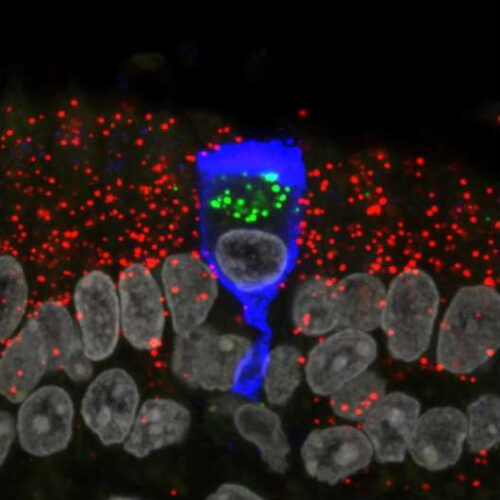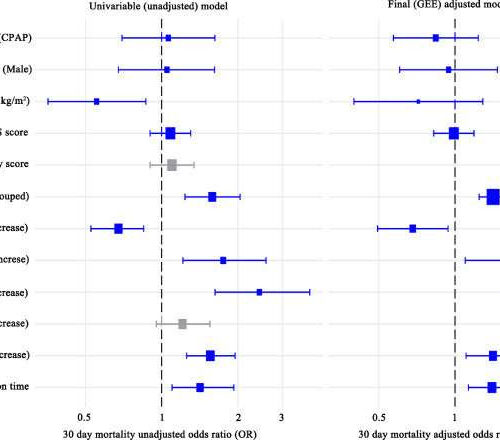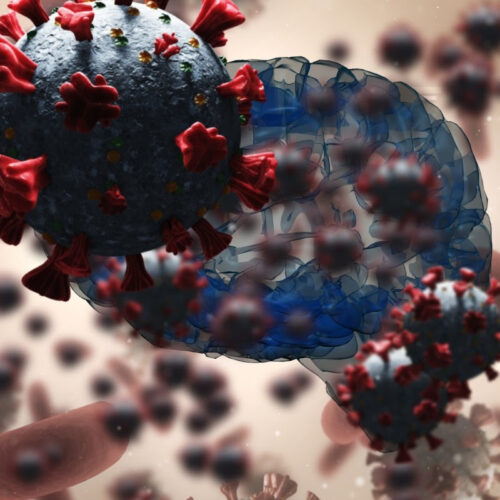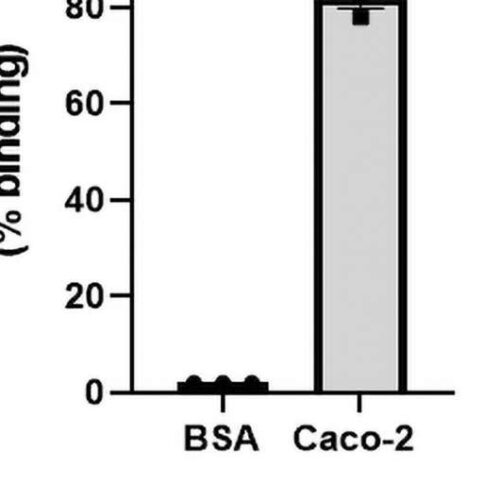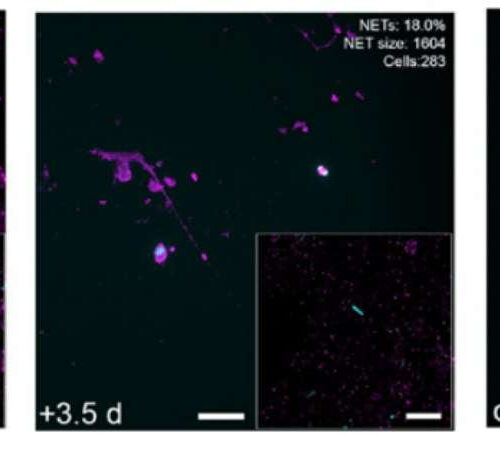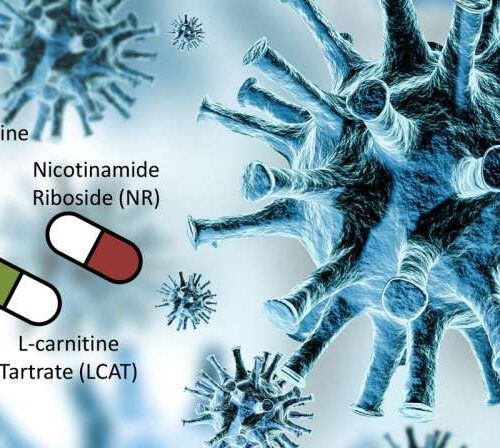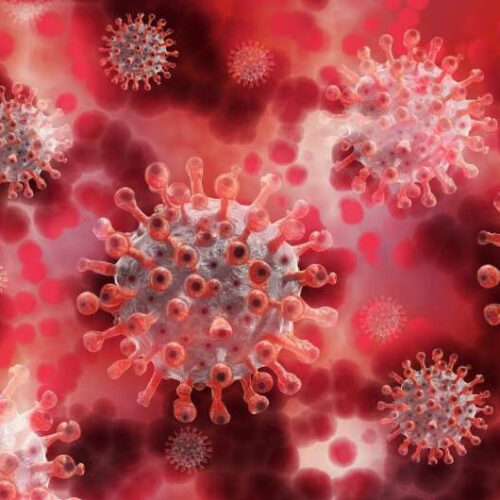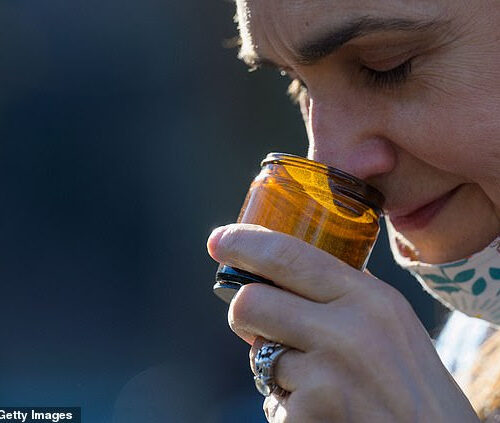by Max Planck Society A lone infected sustentacular cell is surrounded by non-infected cells in the olfactory mucosa of a COVID-19 patient who died four days after diagnosis of the infection. The infected cell has the characteristic shape of a wine glass. The blue color comes from staining with an antibody against the nucleocapsid protein...
Tag: <span>COVID-19 patients</span>
Anticoagulant has beneficial side-effects for COVID-19 patients
MEDICAL UNIVERSITY OF VIENNA Clotting problems and resulting complications are common in COVID-19 patients. Researchers at the Medical University of Vienna have now shown that a member of the anticoagulant group of drugs not only has a beneficial effect on survival of COVID-19 patients, but also influences the duration of active infection with the SARS-CoV-2...
CPAP and oxygen have similar impact on mortality of COVID-19 patients that wouldn’t benefit from intensive care
by Michael Addelman, University of Manchester Figure 130 day mortality unadjusted odds ratios (OR, left) of variables and final Generalized Estimating Equations (GEE) model with estimated 30-day mortality adjusted odds ratios (aOR, right). Variables colored gray were not included in the final GEE model. An OR>1 represents increased occurrence of 30 day mortality. Abbreviations used: FiO2,...
UK study detects cognitive deficits in recovered COVID-19 patients
By Rich Haridy July 25, 2021 Researchers note it is unclear at this stage how long the cognitive dysfunction could last or what specifically is causing it vectorfusionart/Depositphotos A large new study published in The Lancet journal EClinicalMedicine has detected significant cognitive deficits in recovered COVID-19 patients. The research found the more severe the case, the...
New insights into uncontrolled inflammation in COVID-19 patients
QUEEN MARY UNIVERSITY OF LONDON In a new study, published recently in the journal Circulation Research, scientists discover how the production of protective molecules known as specialized pro-resolving mediators (SPM) is altered in patients with COVID-19. The results suggest that treatments that increase SPM production, such as dexamethasone or SPM based drugs, could play a...
Drug could potentially prevent respiratory and cardiovascular damage in COVID-19 patients
by Royal College of Surgeons in Ireland (RCSI) Fig 1. SARS-CoV-2 binds to human epithelial cells and causes permeability. (A) SARS-CoV-2 (1.08 x 105 TCID50/mL) was added to either a control surface (BSA) or human epithelial cells (Caco 2). Cells were allowed to adhere to immobilized SARS-CoV-2 and lysed with pNPP, a fluorescent substrate against alkaline...
Drug dissolved net-like structures in airways of severely ill COVID-19 patients
by Lund University The image to the far left is from the sputum prior to treatment with the DNase drug. The one in the middle was taken 3.5 days after treatment, and the one to the far right was taken the day the patient was discharged. Credit: Lund University When researchers at Lund University in Sweden...
Covid-19 patients recover faster with metabolic activator treatment, study shows
by KTH Royal Institute of Technology The cocktail of metabolic activators was reported to reduce recovery time for COVID-19 patients. Credit: KTH Royal Institute of Technology Metabolic activators can reduce recovery time by as many as 3.5 days in patients with mild-to-moderate COVID-19, according to a study published today in Advanced Science. The researchers also found that treatment with...
Study shows remote home monitoring models can support COVID-19 patients and reduce demand on hospitals
by University of Birmingham Credit: Pixabay/CC0 Public Domain A study led by the National Institute for Health Research (NIHR) BRACE and RSET Rapid Evaluation Centres and undertaken by researchers at UCL, Nuffield Trust, RAND Europe, and the University of Birmingham suggests that effective coordination between primary and secondary care to set up and deliver remote home...
Nearly 5% of COVID-19 patients who lost their smell have still not gotten it back ONE YEAR after having the virus
By MANSUR SHAHEEN FOR DAILYMAIL.COM PUBLISHED: 11:02 EDT, 24 June 2021 | UPDATED: 11:02 EDT, 24 June 2021 A small percentage of COVID-19 patients who have recovered from the virus still have not regained their sense of smell a year later, a new study finds. Anosmia, a partial or total loss of smell in a person, is a common symptom of COVID-19,...

